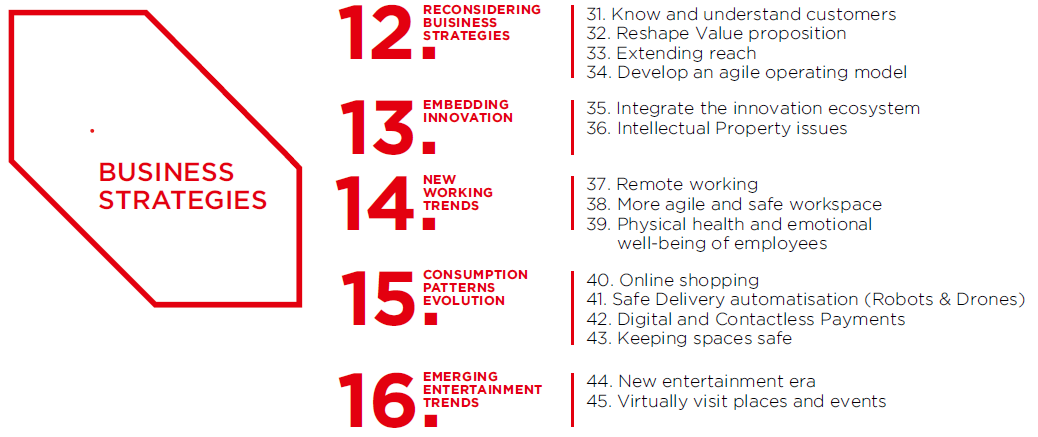비즈니스 전략: 포스트 코로나 이후 시장 동향 활용
COVID-19 팬데믹은 비즈니스 전략에 커다란 영향을 미칠 것으로 예상된다. 룩스이노베이션은 코로나로 인한 소비 패턴의 변화, 새로운 형태의 엔터테이먼트와 관광의 출현, 원격 근무 중요성의 증가 등 위기로 인한 새로운 형태의 혁신은 새로운 비즈니스 모델과 기회로 이어질 것으로 보고 있다. 코로나 이후 메가트렌트 중 새로운 비즈니스 전략에 대한 자세한 내용은 “Post COVID-19 시장 동향” 보고서를 다운받아 볼 수 있다. “Post COVID-19 Market Trends”.
New business strategies are one of the megatrends identified by Luxinnovation’s market intelligence team in its report Post COVID-19 Market Trends. Many companies are reviewing their strategies to ensure their long-term survival, but also to benefit from the new opportunities that have emerged over the past few months.

Towards more flexible business models
The outbreak of the coronavirus pandemic, and the ensuing lockdown and confinement, radically changed the market for a great number of companies. Their survival often depended on their ability to respond to these changes, for example by selling online and offering home deliveries. Some also reoriented their production to personal protective equipment such as facemasks, visors and disinfectants.
“Numerous companies are currently analysing their offering to see whether it still corresponds to what clients want and whether they are focusing on the most relevant target groups,” says Mohamed Toumi, Market Intelligence Analyst at Luxinnovation. “Those who ventured into the medical equipment sector are considering whether to stay in that field or go back to their usual business. The outcome might well be more adaptable business models that are flexible enough to evolve depending on the company’s circumstances.”
Business and market intelligence is crucial for taking decisions based on facts and not feelings.
Digital tools such as business intelligence software are expected to play an increasingly important role in decision making. “Business and market intelligence is crucial for taking decisions based on facts and not feelings,” indicates Head of Market Intelligence Sara Bouchon. “Artificial intelligence and machine learning will be very useful for clustering marketing data as well as data related to fields such as health and transports and providing new insights. Some companies use the findings to find new clients or markets, for example via online sales.”
New business environment
 The public health situation did not only trigger a huge increase in online shopping – globally, e-commerce increased with 174% in March 2020 compared to the same month a year earlier – but also the demand for contactless delivery services and digital payments. New technologies are being developed, but in order for companies to be able to implement them on a large scale, there are also issues to be solved. “If, for example, small delivery robots will start circulating on the pavements, there will be safety issues and the legislation will need to evolve,” comments Mr Toumi. “Rules for cleanliness and new security standards are also needed.”
The public health situation did not only trigger a huge increase in online shopping – globally, e-commerce increased with 174% in March 2020 compared to the same month a year earlier – but also the demand for contactless delivery services and digital payments. New technologies are being developed, but in order for companies to be able to implement them on a large scale, there are also issues to be solved. “If, for example, small delivery robots will start circulating on the pavements, there will be safety issues and the legislation will need to evolve,” comments Mr Toumi. “Rules for cleanliness and new security standards are also needed.”
Luxinnovation estimates that the new working trends that emerged during the crisis are here to stay. “The strong trend of remote working will probably continue and durably impact the organisation of work,” Dr Bouchon points out. “Firms will have to deal with topics such as IT security, privacy issues and timely tech support and reconsider their use of office space. If employees regularly work from home, is one desk per person still needed? At the same time, if several people use the same equipment, adequate measures for health protection will have to be developed and put in place.”
Digital opportunities
Another major market trend identified by Luxinnovation is the upsurge of online entertainment, which is expected to have a long-term impact on consumer behaviour. “The demand for online gaming has obviously gone up, but also that for virtual tourism and museum visits,” says Dr Bouchon. “People are even going as far as creating virtual friends online.” Players in the tourism field are likewise turning to digital solutions, such as virtual concerts and events as well as the virtual spaces opened by many museums to offer remote access to their collections.
The demand for online gaming has obviously gone up. People are even going as far as creating virtual friends.
The online gaming industry is also developing new business models. “People no longer pay just to play games, there are online competitions organised where people buy tickets to watch others play,” explains Mr Toumi. “In addition, companies are paying to have advertisement banners displayed at virtual stadiums used for online games. This is a completely new way of monetising gaming.” A new battle of dominance amongst streaming services, gaming platforms and other forms of at-home entertainment services is expected.
Innovation: the central theme
Innovation stands out as one of the most important factors for companies to be able to adapt to the “new normal” and benefit from these new opportunities. “Before the pandemic, we spoke about innovation as a way of improving products and services. Now, we focus more on innovative business models, innovative ecosystems and innovation in policy and decision making,” says Mr Toumi.
Before the pandemic, we spoke about innovation as a way of improving products and services. Now, we focus more on innovative business models, innovative ecosystems and innovation in policy and decision making.
Partnerships between companies and between public and private players, which it would normally have taken long time to establish, were set up virtually overnight during the crisis in order to respond to urgent needs for medical equipment. “It will be very interesting to see whether these collaborations will continue even after the crisis,” comments Dr Bouchon. “I think that it is quite likely, as cooperation can be an effective means of becoming more resilient to challenges in the future.”
The pandemic also created an unprecedented situation where intellectual property (IP) rights holders sometimes were forced, at least temporarily, to allow third parties to use their patents and designs in line with public interest. “The emergency was such that many companies put IP considerations to the side and used patented technologies to produce what was needed,” says Mr Toumi. “Current procedures for patenting inventions, buying the rights of use, etc. are too rigid and slow to function under such circumstances. The IP system will have to be simplified so that it is flexible enough to function even as new unexpected situations arise in the years to come.”

